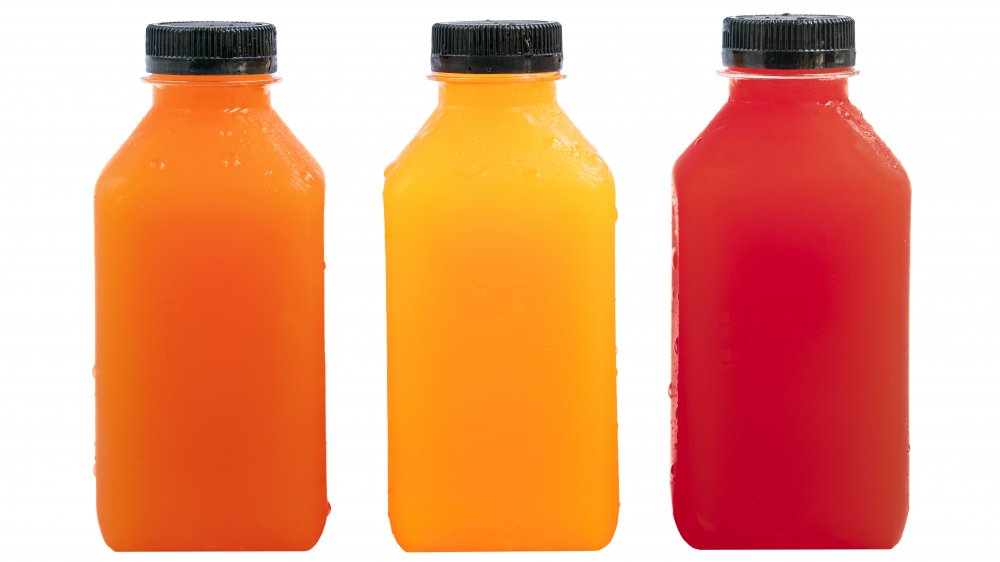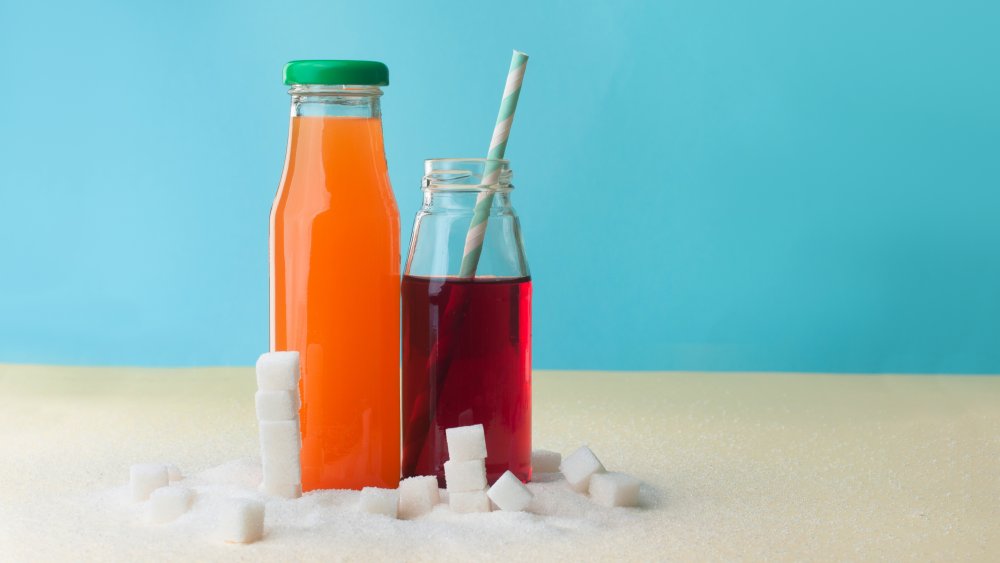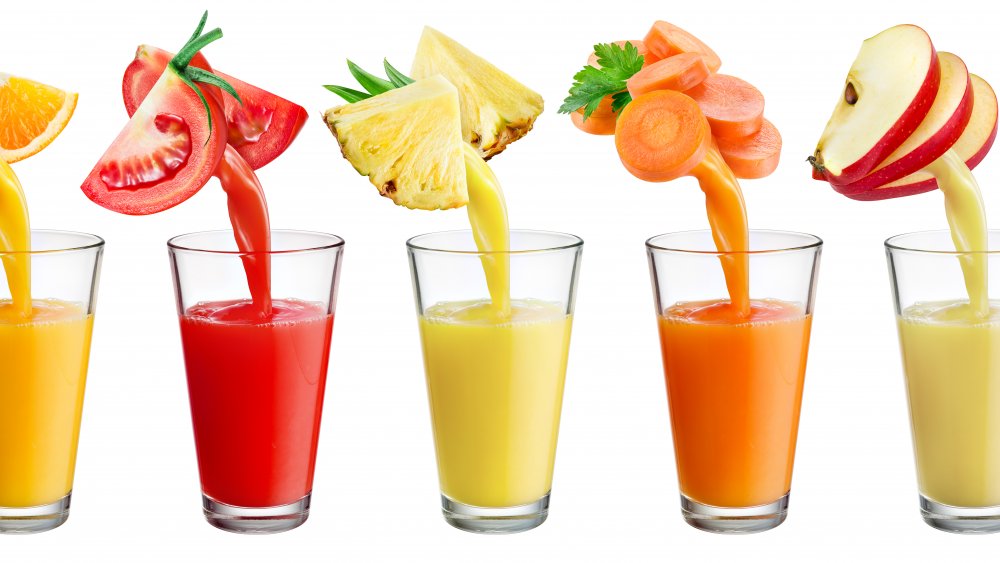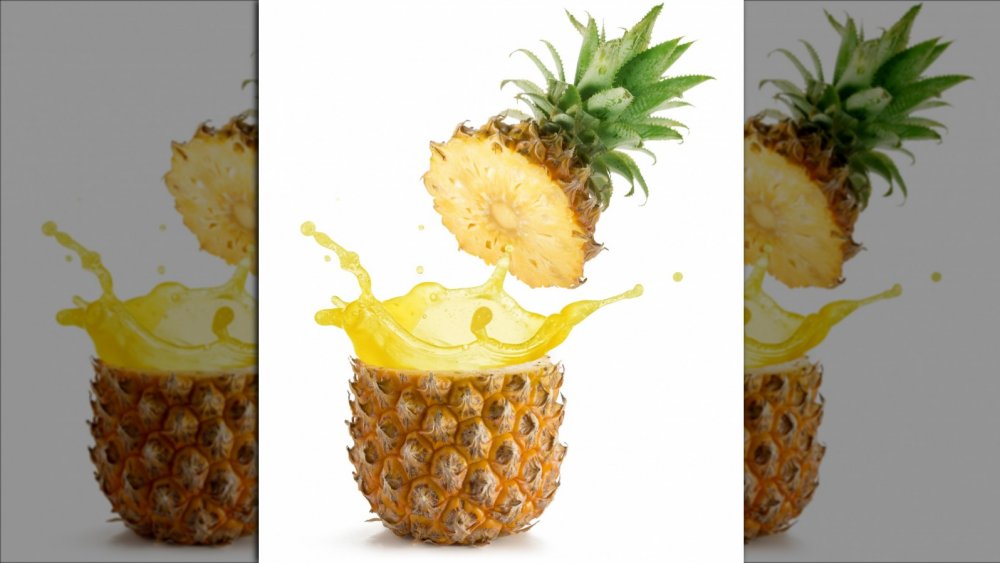Nutrition Expert Exposes Everything Fake About Fruit Juices
When you're thirsty but you want something that's going to be good for you, you know to pass on the soda, since these offer zero benefits apart from hydration. So you grab a juice instead, feeling virtuous that you made the "healthy" choice. Well, we hate to be the bearers of yet more bad tidings, but yes, you can add that item to that ever-lengthening list of foods that nutritionists say aren't actually all that good for us, after all.
So just how unhealthy are fruit juices? The good news is, no scientific studies have (yet) come out with the evidence that they cause cancer, heart disease, or seven years of bad luck. So no, they're probably not going to kill you, or even mess with your health to the extent that, say, Diet Coke can do. The bad news, though, is that according to nutritionist Robin Miller, most types of fruit juice are "basically empty calories in a glass."
Fruit juices are high in sugar and low in fiber
The biggest problem with fruit juices, which is something Miller can't emphasize enough, is the fact that they are all, without exception, extremely high in sugar. She says that this sugar excess causes them to be "absurdly high in calories" – who knew? She also notes that, besides adding to the calorie count, the "boatloads of sugar" contained in fruit juice are bound to promote tooth decay. As Miller points out, "ounce for ounce, soda and juice often deliver the same calories and grams of sugar" (which, needless to say, is way too much).
Not only is fruit juice an unexpected calorie bomb, but it has also been "stripped of that precious, hunger-reducing fiber." As fruit juice lacks any fiber whatsoever, Miller says "it's basically just a sugary drink."
Fruit juice compares poorly to real fruit
Miller says that fruit juice is nowhere near as nutritious as whole fruits. She explains, "Grab [a] real piece of fruit and you'll get the satisfaction of chewing, hydration, vitamins, minerals, and FIBER." The reason for her emphasis on fiber is that this substance "promotes feelings of fullness, slows digestion, and reduces spikes in blood sugar." Sadly, fiber-lacking fruit juices can't provide any of these benefits.
The Academy of Nutrition and Dietetics also mentions the lack of fiber as a concern and advises that even raw juices are no substitute for whole fruits. They recommend that at least 50 percent of daily fruit intake be in the form of actual fruit instead of juice alone. NYC dietitian Cynthia Sass spoke with Time on this subject, as well, voicing her concern that juices aren't nearly as filling a way to take in nutrients as is eating the fruit itself: "While your body likes the vitamins, minerals, and antioxidants, juices lack fiber and don't require chewing, so they're less satiating than whole produce."
Some juices aren't what you think
With some store-bought juices, what you get isn't really the type of juice the label claims it to be. Miller takes a look at Ocean Spray's 100 percent juice and finds it to be a blend of cranberry, grape, apple, and pear juice concentrate plus water, natural flavor, pectin, and ascorbic acid. She says that their cranberry juice cocktail contains water, cranberry juice concentrate, sugar, ascorbic acid, and vegetable concentrate for color. This last ingredient she finds especially questionable, asking: "Aren't cranberries super colorful anyway?"
Miller also brings up Tropicana's alleged-to-be "100 percent orange juice", and points out that its ingredients include filtered water, orange juice concentrate, and "natural flavors not found in regular orange juice." This flavor enhancement isn't found in orange juice alone, though. She says "the same is true of many other popular juices on the market, including grape, pineapple, and cranberry."
Even all natural juices aren't much better
Miller does admit that "pricier, cold-pressed juices may have more micronutrients than juices that have undergone the high-temperature, pasteurization process," but adds that "some juice varieties add those vitamins and minerals back in after pasteurization." She also says that "nonorganic juice is notoriously contaminated with pesticides" but acknowledges that "just because a juice is 'organic' doesn't mean it's good for you."
The fact remains that "real fruit contains natural sugars, so there will always be some sugar on the nutrition label," but even with some high-end, premium juice brands, the level of sugar can be insanely high. Martinelli's Organic Apple Juice, for example, has 180 calories and 39 grams of sugar in one of what Miller calls its "adorable bottle[s]," and she notes that this amount is "the equivalent of 2 Almond Joy candy bars or about 100 Reese's Pieces."
Bottom line: "Read labels and select juices that are 100 percent fruit juice (shocking) with no added sugar. And, when possible, opt for organic." Still, if you want to make the best choice for your health, it seems you should stick to a piece of whole fruit with a side of water.




